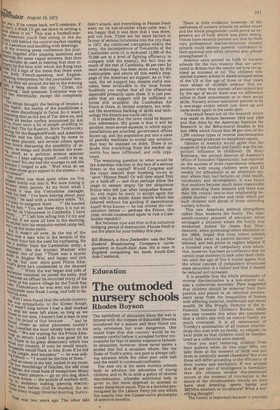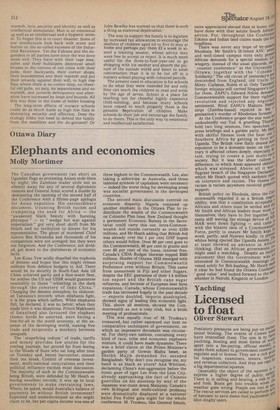Education
The outmoded nursery schools
Rhodes Boyson
The battlefield of education since the war is littered with the corpses of discarded theories introduced for a season and then found not only erroneous but even dangerous. One would hope that this country would be extremely careful before it accepted further innovations for fear of similar expensive failures. In education, however, there never seems a settled line but a situation where, like the Duke of York's army, one part is always calling advance while the other part calls halt and the result is continued confusion.
The new cry is for more nursery schools both to advance the education of young children and to fit in with a policy of reverse discrimination, whereby additional help is given to the more deprived to attempt to make them more equal. This is a doctrine promulgated by the Labour Party yet one which fits exactly into the Conservative philosophy of selective benefits. There is little evidence, however, of the usefulness of nursery schools on either count and the whole programme could prove an expensive act of faith which was plain wrong. Voices have recently pointed out that by their very professional teacher-structure nursery schools could destroy parents' confidence in their parental role while informal play groups strengthened it.
America once pinned its faith to nursery schools for the two reasons that are advocated in Britain but the results are now recognised as minimal or nil. The children who started nursery school in disadvantaged areas of the US at the age of three or four years were ahead of children without this experience when they started infant school but by the age of seven there was no difference either in their attainments or in their social skills. Nursery school education proved to be a one-stage rocket which just went up and came down again in the same spot.
This result bears out all the research which was made in Britain between 1918 and 1939 and that done by the American Institute for Research in the Behavioural Studies in the late 1960s which found that 99 per cent of the 1,200 various types of reverse discrimination investigated produced no beneficial results.
Opinion in America would agree that the support of the mother and family was the im portant influence in childhood. Dr Mary Robinson, the project director of America's Office of Economic Opportunity, has reported on the success of three experiments whereby mothers with young children were paid £2 weekly for attendance at an afternoon ses sion where they had lectures on child health, vocabulary and development. It was found that mothers became much more responsible after attending these sessions and there was then the critical one-to-one relationship between mother / teacher and child which put such children well ahead of those attending nursery schools. This new American method strengthens rather than weakens the family. The nine teenth-century pioneers of education never envisaged a situation where the family was weakened. Indeed Sir James Kay Shut tleworth, when promoting infant education in the 1860s, hoped that even infant schools w9uld fade away as parents become ' more ' lettered, and less prone to neglect infants! If a hundred years of compulsory state education, however, has been so ineffective that we cannot trust mothers to look after their children until the age of five it would appear that the whole concept of compulsory structured state education is a failure and that it should be reduced not increased.
It is possible that the whole philosophy of reverse discrimination is a non-starter out side a collectivist economy. Plato suggested that children should be removed from their parents and placed in an identical environ
ment away from the inequalities of -homes
with differing material, intellectual and moral wealth. Dr Mia Pringle, Director of the in fluential National Children's Bureau, made one step towards this when she considered that a child's ties with its natural family are much overrated. It is all reminiscent ol' Trotsky's atomisation of all human relationship's into dust with no family, no religion, no local pride so that children could be manipulated as a collectivist state desired.
Once you start removing children from their parents when do you stop? Why not take them at the moment of birth and put them in medically sealed chambers? But even these will differ according to the efficiency of their nurses and mechanics. If one accepts that 80 per cent of intelligence is hereditary then the ultimate reverse discrimination occurs at the moment of conception in the dance of the chromosomes. Should we then have stud breeding, sperm banks and MENSA mothers or incubators? What a horrifying thought! The family is important because it provides warmth, love, security and identity as well as intellectual stimulation Man is an emotional as well as an intellectual and a hygienic animal. To forget this is to court disaster. Some of our intellectuals look back with scorn and horror on the so-called excesses of the Industrial Revolution. Yet the Fabians and the dogooders in all parties have since the war done more evil. They have with their tape measures and their bulldozers destroyed small houses in the centres of our cities with their pubs, their backyards, their corner shops, their launderettes and their warmth and put their tenants, against their will, in high rise flats where there is no corner shop, no cheerful old pubs, no pets, no separateness and no warmth, and juvenile delinquency and alienation have increased by leaps and bounds, All this was done in the name of better housing The long-term effects of nursery schools could do as much harm as high rise flats in destroying security and affection. Does the ecology lobby not need to defend the family from the meddlers and the do-gooders? Dr John Bowlby has warned us that there is such a thing as maternal deprivation. '
The way to support the family is to legislate by increased tax allowances to encourage the mothers of children aged nil to five to stay at home and perhaps pay them E3 a week to attend a training session, whose advice they were free to accept or reject. It is much more useful for the three-to-four-year-old to go shopping with his mother and absorb the picture of the outside world and listen to adult conversation than it is to be cut off in a nursery school playing with coloured pencils. The present need in education is for schools to do what they were intended for and only they can teach the children to read and write by the age of seven. School is a place for teaching not for cheerful highly expensive child-minding, and because many schools have ceased to teach properly there is the genuine deprivation of children. Make schools do their job and encourage the family to do theirs. This is the only way to emotional and intellectual satisfaction.

































 Previous page
Previous page